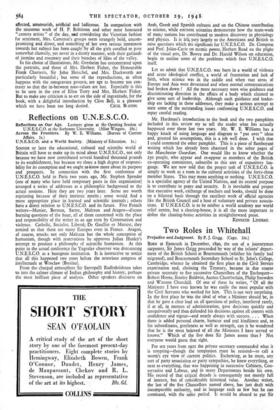• Reflections on U.N.E.S.C.O.
Reflections on Our Age. Lectures given at the Opening Session of Affairs. Is.) U.N.E.S.C.O. and a World Society. (Ministry of Education. Is.)
SOONER or later the educational, cultural and scientific world of Britain will have to make up its mind about U.N.E.S.C.O., not only because we have now contributed several hundred thousand pounds to its establishment, but because we share a high degree of responsi- bility for its conception and we ought teknow more about its purpose and prospects. In connection with the first conference of U.N.E.S.C.O. held in Paris two years ago, Mr. Stephen Spender (one of many who have held temporary posts in this organisation)_ arranged a series of addresses as a philosophic background to the actual sessions. Here they are two years later. Some are worth reprinting because of their intrinsic merits ; some would find a more appropriate place in learned and scientific journals ; others have a direct relation to U.N.E.S.C.O. and its future. Five French writers—Munier, Bertaux Sartre, Malraux and Aragon—discuss burning questions of the hour, all of them concerned with the place and responsibility of the writer in an age torn by Communism and violence. Catholic, Socialist, Liberal; De Gaullist or Marxist, they remind us that there are many Europes even in France. Aragon, of course, attacks not only Malraux but the whole conception .of humanism, though with reservations he approves Julian Huxley's attempt to produce a philosophy of scientific humanism. At this point in the actual conference the Yugoslav observer was denouncing U.N.E.S.C.O. as a bourgeois institution. It is instructive to notice that all this happened two years before the notorious congress of intellectuals at Wroclaw (Breslau).
From the charged atmosphere Sir Sarvepalli Raclhakrishnan takes us into the calmer climate of Indian philosophy and history, perhaps the most brilliant piece of analysis. Other speakers discourse on Arab, Greek and Spanish cultures and on the Chinese contribution to science, while eminent scientists demonstrate how the team-work of many nations has contributed to modern discovery in physiology and physics. It is lett- yery largely to the Americans and British to raise questiors which are significant for U.N.E.S.C.O. Dr. Compton and Prof. Joliot-Curie on atomic power, Herbert Read on the plight of the visual arts, Dr.''Bowra and Dr. Harold Wilson on education, begin to outline some of the problems which face U.N.E.S.C.O. itself.
Let us admit that U.N.E.S.C.O. was born in a world of violence and acute ideological conflict, a world of frustration and lack of faith, when science was in the saddle and when vast areas of Europe and Asia were devastated and when normal communications had broken down ! All the more necessary were wise guidance and discriminating direction in the affairs of a body which claimed to give some sort of leadership. Although such guidance and leader- ship are lacking in these addresses, they make a serious attempt to state some of the outstanding issues confronting U.N.E.S.C.O. and repay careful reading.
Mr. Hardman's introduction to the book and the two pamphlets included in this review try to tell the reader what has actually happened over these last two years. Mr. W. E. Williams has a happy knack of using language and diagram to "put over" ideas and, granted his assumptions, this is a job well done. I wish that I could commend the other pamphlet. This is a piece of flamboyant writing which has already been chastised in the sober pages of the Manchester Guardian. One would like to know whether the 250 people, who appear and re-appear as members of the British co-operating committees, subscribe to this sort of expository lan- guage. We are now told that the proper task of U.N.E.S.C.O. is simply to work as a team in the cultural activities of the forty-three member States. This may mean anything or nothing. U.N.E.S.C.O. is a specialist agency of the United Nations, and its central purpose is to contribute to peace and security. It is inevitable and proper that executive work, eithange of teachers and books, should be done on a bilateral basis through the excellent work of official agencies like the British Council and a host of voluntary and private associa- tions. If U.N.E.S.C.O. is to be neither a world academy nor world relief centre, but a clearing-house, it is all the more important to define the clearing-house activities in straightforward prose.
KENNETH LINDSAY.


































 Previous page
Previous page